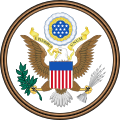Parts of this article (those related to needs information after 2015) need to be updated.(October 2024) |
Ecology Party of Florida | |
|---|---|
| | |
| Chairperson | Cara Campbell [1] |
| Treasurer | Gary Hecker [1] |
| Founded | 2008 [2] |
| Headquarters | Fort Lauderdale, Florida |
| Membership (2012) | 125 [2] |
| Ideology | Anti-vaccination [3] Climate change denial [3] Regionalism |
| Seats in the Florida Senate | 0 / 40 |
| Seats in the Florida House of Representatives | 0 / 120 |
| Website | |
| ecologyparty | |
The Ecology Party of Florida is a minor political party in the United States state of Florida. Founded as a front group to support Ralph Nader's 2008 presidential candidacy, it has remained minimally active in the years since that election.

